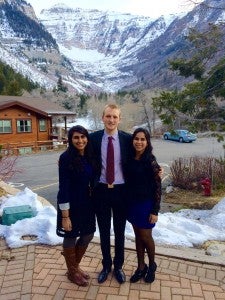A Reflection on the Wheatley International Affairs Conference
In February, I had the opportunity to attend the Wheatley International Affairs Conference, hosted by Brigham Young University in Provo, Utah. The conference revolved around power and politics in the Middle East and simulated US policy creation. My focus was the role of civil society in Middle Eastern politics—how personal relationships and community-building create daily stability. Though I was academically immersed in the civil society structure of Egypt and Jordan, I was fascinated by the Mormon civil society that surrounded me.
The whole experience was a culture shock. Immediately upon landing in the Salt Lake City airport’s arrivals terminal, I was surrounded by crowds of families holding smiley-face balloons. It was my first glimpse of the city and its deep ties to the Mormon way of life. I watched as a young man emerged from the terminal and was met with cheers and hugs from an entire wall of the receiving line. Returning from his Mormon mission, he seemed overwhelmed by a mix of shock and love.
The homogeneity was striking as well. Having grown up as a minority in predominantly Caucasian towns, I expect a white majority but have never felt the difference in such a way. While at BYU, a little girl came up to me and just… stared. Despite the superficial difference, most of the people I encountered were enormously hospitable. From cashiers to van drivers to airport police, people were respectful and overly kind; they had genuine conversations with me instead of an East Coast “hi-how-are-you.” There was certainly a standard of behavior that permeated the community and formed a fortified civil society.
What struck me the most was the core role of religion at BYU. The Mormon culture is deeply rooted in and enforced by community values. For instance, Mormons forbid tea, coffee, and alcohol—three drinks that Americans often associate with getting to know new people. Since Mormon youth don’t go to bars, they tend to hang out with other people who don’t drink, and the community tightens.
In that sense, though, my parents always found an Indian community wherever we lived. Their “Indian civil society” could be the only other Indian person in town or an amalgamation of boisterous, entertaining families who filled our house with laughter. For first-generation Indian immigrants, they wanted to be around people who shared similar core identities. As the minority, we stuck together. It’s the same thing for civil societies in the Middle East and those in Utah. As people share values and cultural norms, their community strengthens and becomes more stable.
While at the conference, my friends from BYU explained that they play group games instead of drinking. We bonded over wordplay and Bananagrams, staying up for hours in the cabins. As we chatted, I was struck by the severity of my own preconceptions. The tightness of Mormon society was, at foundation, based on the need to share their core identity with others. I was humbled by my perception shifts and enormously grateful for the patience of my Mormon friends as they fielded endless questions. Despite our ample ideological differences, we were able to understand each other and honor the integrity of the cultures.
Devika Ranjan, SFS ’17
- Tagged
- Interfaith
